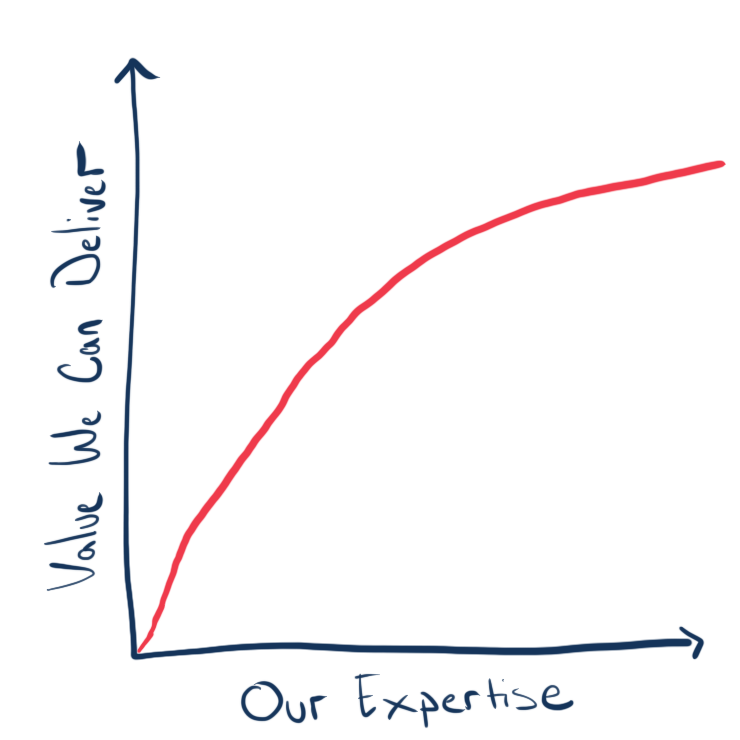Why Does Expertise Matter?
Expertise matters because the world is a complex place. Humans collectively “divide and conquer” this complexity through the individual attainment of expertise that can then, in one way or another, be shared with the rest of society. At Paid Search Done Well, we’ve built deep expertise in a focused chunk of the complex world of digital marketing. This expertise is meaningful because it allows us to deliver more value to our clients and to ultimately share in that value.
What is Expertise?
A big part of expertise is pattern recognition. An expert must quickly understand a situation (know where to look for information and what to look for) and react appropriately (synthesize the new information with past experience and take action based on the desired outcome).
Someone’s ability to quickly understand a given situation depends on two things:
- How familiar a situation is to them (“I’ve seen some of this before”).
- Actively looking with “fresh eyes” for gaps in their existing understanding (“What of this have I not seen before?”).
Someone’s ability to react in an appropriate way is the other side of the expertise coin. It depends on what tools are in the expert’s toolbox and how well they can use those tools. If you have a problem that requires you to drill a hole in concrete, for example, you’d better be able to first diagnose the problem and then have the right tools and skills to address it.
Expertise is an additive, evolving, old-growth-forest kind of thing that is attained over time through iteration and practice. It’s not binary in the sense that someone either does or does not possess it. This means that we can correctly refer to someone as being “more” or “less” expert in a given field. It’s not an either / or thing.
Someone who is more expert in a given field can, by definition, consistently better understand and react to situations in that field than someone who is less expert.
How to Gain Expertise?
To gain expertise, one must focus. To focus is to define boundaries around a claim of expertise and to generally say no to things that are outside of that claim. For example, the path someone takes to becoming an expert pediatric heart surgeon involves a lot of very specific (focused) practice and a lot of saying “no” to things outside of that focus area.
At first blush, saying “no” to opportunity is a sobering notion for creative entrepreneurs like myself who enjoy (at least the idea of) transforming all kinds of novel and disparate ideas into real projects and businesses. However, all successful entrepreneurs (and artists, scientists, etc.) have benefitted from the freedom that disciplined focus brings. It’s true that many of these folks have produced wildly different work throughout their long careers, but they’ve been able to do this by carving out distinct periods of focus in which they go deep and then reap the rewards of that effort. Ultimately their true expertise is in building expertise.
At Paid Search Done Well our focus and claim of expertise looks kind of like this:

This drawing already represents a pretty zoomed in view of the universe of what we could focus on. Saying “no” doesn’t mean that we’re not interested in these things or even that we won’t spend some time learning about them. It just means that we’re not claiming or working to build expertise in these areas.
The Marginal Utility of Expertise

In the above chart, the red line represents the intersection between the value we can deliver to our clients (Y axis) vs our level of expertise (X axis). This line shoots up dramatically at first as we earn basic expertise. The slope of the line necessarily plateaus over time because of the natural diminishing returns of expertise. At some point an extra unit of expertise gained cannot deliver as much value as the first few units of expertise could. But why? A couple of reasons:
- Burrowing deeper and deeper into the intricacies of a given subject usually doesn’t reap the same level of results as the initial learning does. It’s like the marginal utility of a dollar. When you don’t have many dollars, gaining one more can be hugely helpful in buying basic things like food and shelter. When you already have a lot of dollars, gaining one more can’t add nearly as much value to your life.
- As expertise grows, previously difficult concepts become routine and comfortable which can be both a blessing and a curse. If you’re not aware of the pitfalls of comfort you can start to drop the ball and make mistakes. Atul Gawande writes about this concept in his excellent book The Checklist Manifesto and offers a clear way through this pitfall (spoiler alert: it’s checklists). At Paid Search Done Well we are aware of the dangers of “comfort” and have several checks in place to avoid them. Automation, where possible, helps a lot with this.
The pursuit of perfection can be a noble journey, but by the time you’re bringing an input from 95% to 100% most of the output gains have already been realized. Someone who’s been a heart surgeon for 10 years is almost certainly more expert than someone who’s been doing it for “only” five years. But now take the surgeon of 10 years and compare her to one who’s been doing it for 15 years. That’s the same five-year time gap as between five and 10 years of experience, but my guess is that the gaps in expertise and outcomes are far narrower in the latter comparison. There are many caveats to this and I’m fully aware that the amount of time spent doing something is far less important to earning expertise than what’s done during that time, but the point is still generally valid.
Essentially, when an individual gets to a certain level of expertise their work becomes more about maintaining that expertise as opposed to devoting immense effort to closing the last 5% gap between great and perfect. It really is a balancing act between preparing to deliver excellence and actually delivering it. This balancing act is present both within individuals and across teams. At every step of the way individuals and teams prepare and deliver to the best of their current ability. The mix of expertise on a team not only affects the quality of that team’s output but, because expertise is rare and valuable, it also affects the cost of delivering that output (e.g. partners in law firms bill at >3x the rate of associates, so you only want the partner involved when they really need to be). One of my responsibilities as the Founder & Principal of Paid Search Done Well is to calibrate our project teams so that we can deliver excellence for our clients within their budget constraints.
Why Does Paid Search Done Well Focus And Build Expertise?
Because it’s way more fun to be really good at something as opposed to being a “master of none” generalist.
Because expertise allows us to deliver far more value to our clients. This not only feels great but it also allows us to participate in that value and to build our own profitable, sustainable business – which also feels great.
Because the pursuit of expertise as a core value creates a framework that informs the direction of our company.
How Does Paid Search Done Well Build Expertise?
We set clear boundaries and don’t claim to be an “integrated” or “full service” agency that can do it all for you. We don’t even pretend to do this (as many do) by hiring white-labeled contract help to deliver services outside of our core expertise. We do what we do, we do it well, and we’re transparent about it.
We find ways to automate routine tasks so that we can train our efforts on strategy and other things that can’t be automated.
We serve clients that fit a specific profile that we know we can provide great value to. Over time this focus enhances our ability to intuitively recognize potential problems and opportunities across accounts.
We spend time taking in information from outside our realm of expertise. Nurturing our curiosity is not only fun, but it also often provides valuable new perspectives on our core realm of expertise.
Putting a Bow on it
So, that’s what expertise means to us at Paid Search Done Well. We know that it’s impossible for an individual to gain meaningful expertise in more than one or maybe two professional pursuits at once. Going back to the heart surgeon analogy above, a large agency is kind of like a hospital that can successfully house and nurture many different fields of expertise. We’re not, and don’t aspire to be, a large agency. Like the expert pediatric heart surgeon with her own practice, we’re experts in paid search for ecommerce. That’s where our expertise lies, that’s what we do, and we’re pretty damned good at it.











